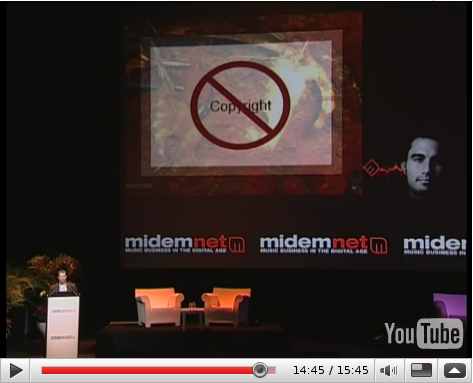Mike Masnick posted video of a pretty good lecture on successful “music” business models based on the success of Nine Inch Nails’ Ghosts I-IV and other efforts. Earlier today I praised the lecture on the Creative Commons blog.
At the end of the video Masnick says that copyright isn’t even necessary for the model he describes (capture above), and that hearing this upsets people.
But this begs the question of whether any “business model” is necessary for music at all.
My other complaint (and I’m almost as guilty as anyone) is a near total failure to look at obvious examples slightly outside the contemporary first world milieu (i.e., the past, future, and much of the present world). This is a general unrelenting complaint, not directed at Masnick’s 15 minutes in front of an industry conference!

Hey Mike,
Not entirely sure what you mean by whether or not any business model is necessary for music. Two points: just because you don’t need copyright, doesn’t mean a business model isn’t being used. Second: on the whole, you most certainly *don’t* need a business model to create and distribute music, but that doesn’t mean a business model is a bad thing.
As for looking at examples outside the contemporary first world milieu, I agree… and have tried to do that at times on Techdirt as well. But, in this case, the folks at Midem specifically called me up and said “we want you to do a presentation on Reznor.” So that’s what they got. :) Would love to do a presentation that looks at alternatives outside the mainstream and modern day world.
Hi Mike,
Just discovered your blog. Great to find another blogger who uses CC0 waiver.
You might be interested in this list of notable works dedicated to the public domain.
http://setfree.wik.is/
Keep up the good work!
jorel314, thanks and of course I’ve noticed http://setfree.wik.is before and like it. :)
Mike, “most certainly *don’t* need a business model to create and distribute music” is what I meant. Here I’m almost exclusively interested in the public policy angle, which doesn’t (or rather shouldn’t) privilege producer welfare. Nothing wrong with having a business model that doesn’t depend on censorship or other exclusion.